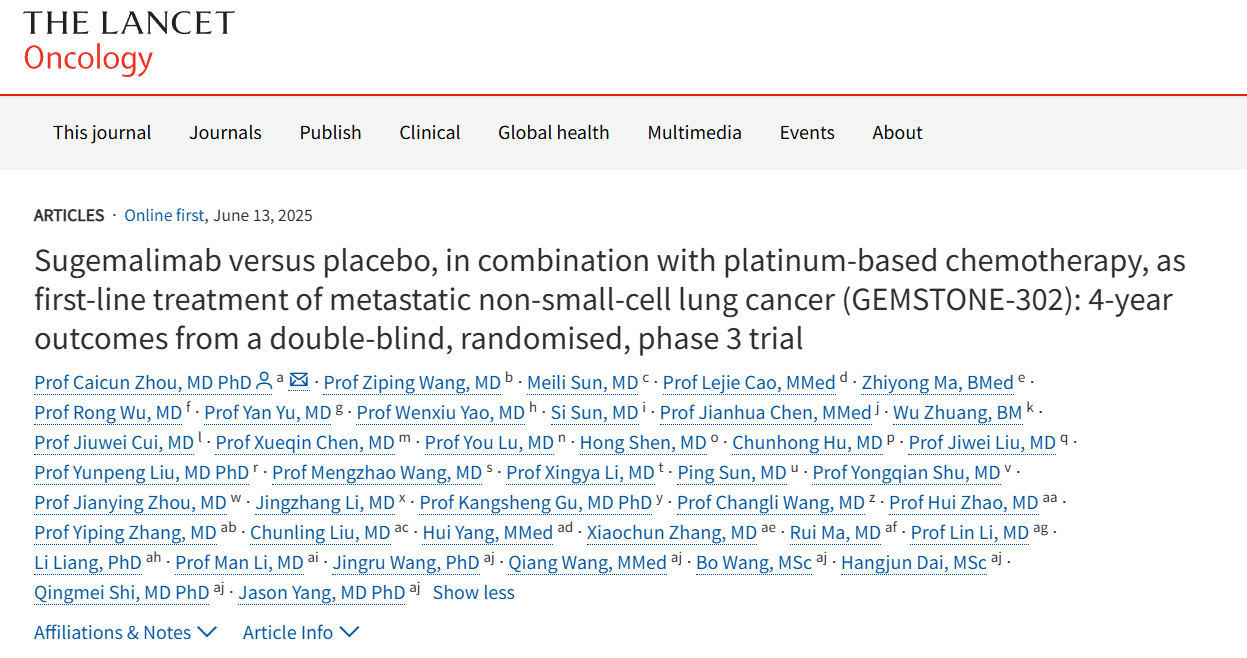Suzhou, China, June 19, 2025—CStone Pharmaceuticals (“CStone”, HKEX: 2616), a biopharmaceutical company dedicated to developing innovative cancer therapies, today announced the publication of long-term survival data from its Phase III GEMSTONE-302 trial in The Lancet Oncology, a globally renowned medical journal. The study evaluates sugemalimab combined with platinum-based chemotherapy as a first-line treatment for both squamous and non-squamous, non-oncogene-addicted metastatic non-small cell lung cancer (NSCLC). This marks the trial’s third publication in top-tier journals, following earlier reports of final progression-free survival (PFS) analysis in The Lancet Oncology (2022) and interim overall survival (OS) results in Nature Cancer (2023). The latest results reinforce sugemalimab’s clinical value and its established role as a standard first-line therapy for advanced NSCLC in China and Europe.

*Screenshot from the official website of The Lancet Oncology
GEMSTONE-302 is a multicenter, randomized, double-blind Phase III clinical trial comparing the efficacy and safety of sugemalimab combined with platinum-based chemotherapy against placebo plus chemotherapy in treatment-naïve Stage IV NSCLC. The primary endpoint was investigator-assessed PFS, and key secondary endpoints included OS, blinded independent central review (BICR)-assessed PFS, investigator-assessed PFS in PD-L1 expression ≥1% subgroups, objective response rate (ORR), duration of response (DoR), and safety. Supported by robust clinical evidence from this study, sugemalimab has been approved in China, the EU, and the UK as a first-line treatment for metastatic NSCLC and also recommended in the ESMO guideline for both squamous and non-squamous, non-oncogene-addicted metastatic NSCLC.
GEMSTONE-302: key data highlights from The Lancet Oncology publication:
Dr. Jason Yang, CEO, President of R&D, and Executive Director of CStone, stated: “The triple publication of GEMSTONE-302 data in premier journals demonstrates global scientific recognition of sugemalimab’s validated clinical profile. These results not only establish the regimen’s durable survival advantage but also solidify its evidence-based position in the treatment algorithms for metastatic NSCLC in China and Europe. Through commercialization partnerships, we are expanding sugemalimab’s global access in alignment with regulatory approvals across major markets, aiming to fulfill our vision of benefiting patients worldwide by pioneering innovative therapies.”
Professor Caicun Zhou from Shanghai East Hospital (Tongji University), Principal Investigator of GEMSTONE-302, commented: “This Lancet Oncology publication reaffirms the established clinical value of sugemalimab-chemotherapy as a first-line regimen for advanced NSCLC. The regimen elevated the 4-year survival rate to 32.1%—nearly doubling the historical benchmark of 17.3% with chemotherapy alone—delivering significant long-term clinical benefits. Notably, in high-risk populations such as patients with baseline brain metastases, the combination provides clinically actionable outcomes. Its consistent efficacy across diverse patient populations and manageable safety profile will further inform the clinical practice in first-line treatment of NSCLC.”
About Sugemalimab (Cejemly®)
The anti-PD-L1 monoclonal antibody sugemalimab was developed by CStone using OmniRat® transgenic animal platform, which allows creation of fully human antibodies in one step. Sugemalimab is a fully human, full-length anti-PD-L1 immunoglobulin G4 (IgG4) monoclonal antibody, which may reduce the risk of immunogenicity and toxicity for patients.
The European Commission (EC) and the Medicines and Healthcare products Regulatory Agency (MHRA) have approved sugemalimab in combination with platinum-based chemotherapy for the first-line treatment of patients with metastatic NSCLC with no sensitizing EGFR mutations, or ALK, ROS1 or RET genomic tumor aberrations. In March 2025, a Type II variation application has been submitted to the European Medicines Agency (EMA) for sugemalimab. The application seeks approval for the treatment of patients with unresectable stage III NSCLC who have not progressed following concurrent or sequential platinum-based chemoradiotherapy.
The National Medical Products Administration (NMPA) of China has approved sugemalimab for five indications:
About CStone
CStone Pharmaceuticals (HKEX: 2616), founded in late 2015, is an innovation-driven biopharmaceutical company focused on advancing cutting-edge oncology therapies. Committed to addressing unmet medical needs globally, the company has achieved remarkable milestones since its inception, including the successful launch of four novel therapeutics and securing 16 regulatory approvals across nine indications. CStone's robust pipeline features 16 high-potential candidates, including first-in-class and best-in-class assets such as antibody-drug conjugates (ADCs), multispecific antibodies, immunotherapies, and precision medicines. The company further distinguishes itself through a seasoned leadership team with comprehensive expertise in drug development—from preclinical research and clinical trials to manufacturing, business development, and commercialization.
For more information about CStone, please visit www.cstonepharma.com.
IR contact: ir@cstonepharma.com
PR contact: pr@cstonepharma.com
Forward-looking statements
The forward-looking statements made in this article only relate to events or information as of the date when the statements are made in this article. Except as required by law, we undertake no obligation to update or publicly revise any forward-looking statements, whether as a result of new information, future events or otherwise, after the date on which the statements are made or to reflect the occurrence of unanticipated events. You should read this article completely and with the understanding that our actual future results or performance may be materially different from what we expect. All statements in this article are made on the date of publication of this article and may change due to future developments.
Disclaimer: only for communication and scientific use by medical and health professionals, it is not intended for promotional purposes.
Your privacy is important for us. We use cookies to enhance your experience when visiting our websites: performance cookies show us how you use this website, functional cookies remember your preferences and targeting cookies help us to share content relevant to you. Select “Accept all” for giving your consent to all cookies or select “Reject all” for using only strictly necessary cookies.